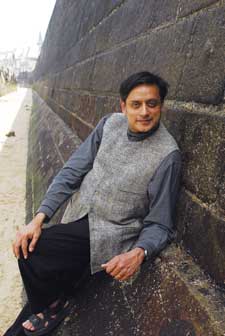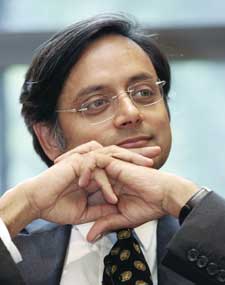Magazine
Shashi Tharoor: The Next UN Secretary General?

|
Many years ago when Shashi Tharoor was asked about his passion for writing, he quoted George Bernard Shaw: “I write for the same reason that a cow gives milk.” As he explained, “I’ve always tried to do – studying and writing, or working and writing – because I see myself as a human being with a number of concerns about the world: some of which I manifest through my work, whether it’s for hrefugees or peacekeeping; and some of which I manifest through my writing.”
Writing has always been interwoven with his work-life. He is the winner of several awards, including the Commonwealth Writers’ Prize. His books include Reasons of State, The Great Indian Novel, Show Business and India: From Midnight to the Millennium (1997). In an exclusive interview Shashi Tharoor talks with Little India about life since his nomination as UN Secretary General. Q: How has your life changed since India nominated you for the post of the United Nations Secretary General? A: It has changed considerably. For one thing, I find myself doing a lot of traveling on the campaign trail, which makes it difficult for me to fulfill my daily work at the UN. From mid-July I have in fact decided to take leave for several weeks, both to concentrate on my campaign and to avoid any perception of a conflict of interest. Q: Do you think this nomination can clash with India’s aspirations for a permanent seat on the Security Council? A: No. The two issues are unrelated. Security Council hreform is a structural issue at the UN. Many countries believe that the Council hreflects the geopolitical realities of 1945, not 2006. Member states have been discussing hreform for over a decade, but have yet to agree on the shape of that hreform. I sometimes joke it’s like a bunch of doctors gathered around a patient who all agree on the diagnosis, but disagree on the prescription! Until there is agreement amongst two-thirds of the member states about a formula for council expansion, there won’t be a framework within which India can seek a permanent seat. That will take time, whereas the SG race will be settled one way or the other within a few months. Some point to the convention that permanent members of the Council cannot put forward candidates for SG, and suggest that disqualifies India. But that unwritten convention resides on the fundamental principle that no one country should have both the right to initiate action at the UN (through the SG) and stop action (through the veto). India is not currently a permanent member of the Security Council and should it obtain this status it has already agreed to forego the veto for 15 years, so this argument does not apply to India. The next SG is not going to have to face a veto-wielding India. So there is no obstacle to India pursuing both objectives. Certainly it shouldn’t have to deny itself the secretary generalship in the name of a security council seat it doesn’t actually have! Q: You have written extensively and are very respected as an author. Yet all your books have dealt with India. Can that be seen as a negative, affiliating you with India in people’s minds? A: I write about what moves me and that happens to be India. But my writing has never affected my work for the UN – in hrefugees, in peacekeeping, in the SG’s office, and now heading a key department. My writing is one way of responding to the world, my work is another. I’ve tried to keep the two apart: in my work I have never dealt with India, whereas in my writing I have dealt with nothing but India! At the same time both emerge from the same individual human being. My outlook and imagination have been shaped at least as much by my growing up in India as by my international working life. Q: On the other hand, you do bring the rare talents that define good journalists and writers – objectivity and observation. Do you think your ability to stand back as an observer and see the world for what it is and the objectivity that writers need to create an imaginary world will stand you in good stead? Q: Do you think your high visibility in the international world of letters and close connections to Kofi Annan’s administration plus points or negatives? Q: Would some feel that your commitment to writing would interfere with you giving your undivided attention to the needs of the top job at the UN? Or is writing like breathing, a natural must for you? Q: Now that you have been nominated, what are the next steps? A: Persuading a majority of the members of the security council to support me and ensuring that none of the permanent members veto me. There’s a non-binding straw ballot due on July 24, after which candidates campaign and perhaps new ones emerge. The council will probably have several more ballots in September and October, following which they send one name to the General Assembly, which usually ratifies it without debate.
Q: How has your family reacted to the nomination? A: A mixture of excitement and dread. My sons think it’s cool, but they are careful not to get engaged in this. They are independent adults now, entitled to their own views on world affairs, which are not necessarily mine. My sisters are following the press accounts avidly. My mother says she’d much rather I had a peaceful life. But those who had the most fun of all were undoubtedly my uncles, aunts, cousins and grandmother back in Kerala, where the media really made a huge fuss about my nomination and they were on TV every day for a week! Q: Are we going to lose Shashi Tharoor the writer if we gain Shashi Tharoor, UN Secretary General? Are you working on anything currently? Q: You have traveled all over the world on conflict resolution assignments. What has been the most heart-rending and which made you want to change the way the world operates? I doubt we will ever be able to end man’s inhumanity to man, but we can certainly improve the way the world operates in responding to such crises, so that we can end the suffering more swiftly, both by stanching the wounds and by healing the cause of the injury. Q: You have written extensively about Nehru and how your views have been shaped by him. How is your relationship with the Gandhi family? Q: Finally, a wish list. What would be the changes you’d like to bring about if you become Secretary General? I will seek to ensure both continuity and change. And that means the UN must embrace sensible hreform…. And in the broader world, if there’s one thing I’d like to change, I wouldn’t say “abolish war,” because I don’t think that’s realistically possible. What I’d say instead is “educate girls.” It’s the one thing that can transform the world. Educate a boy and you educate a person; educate a girl and you educate a family, a community, a society. Educated girls become better-informed mothers and more empowered human beings; they are less vulnerable to AIDS and other diseases; they bring up educated children. That would be my crusade – to end female illiteracy. |



You must be logged in to post a comment Login